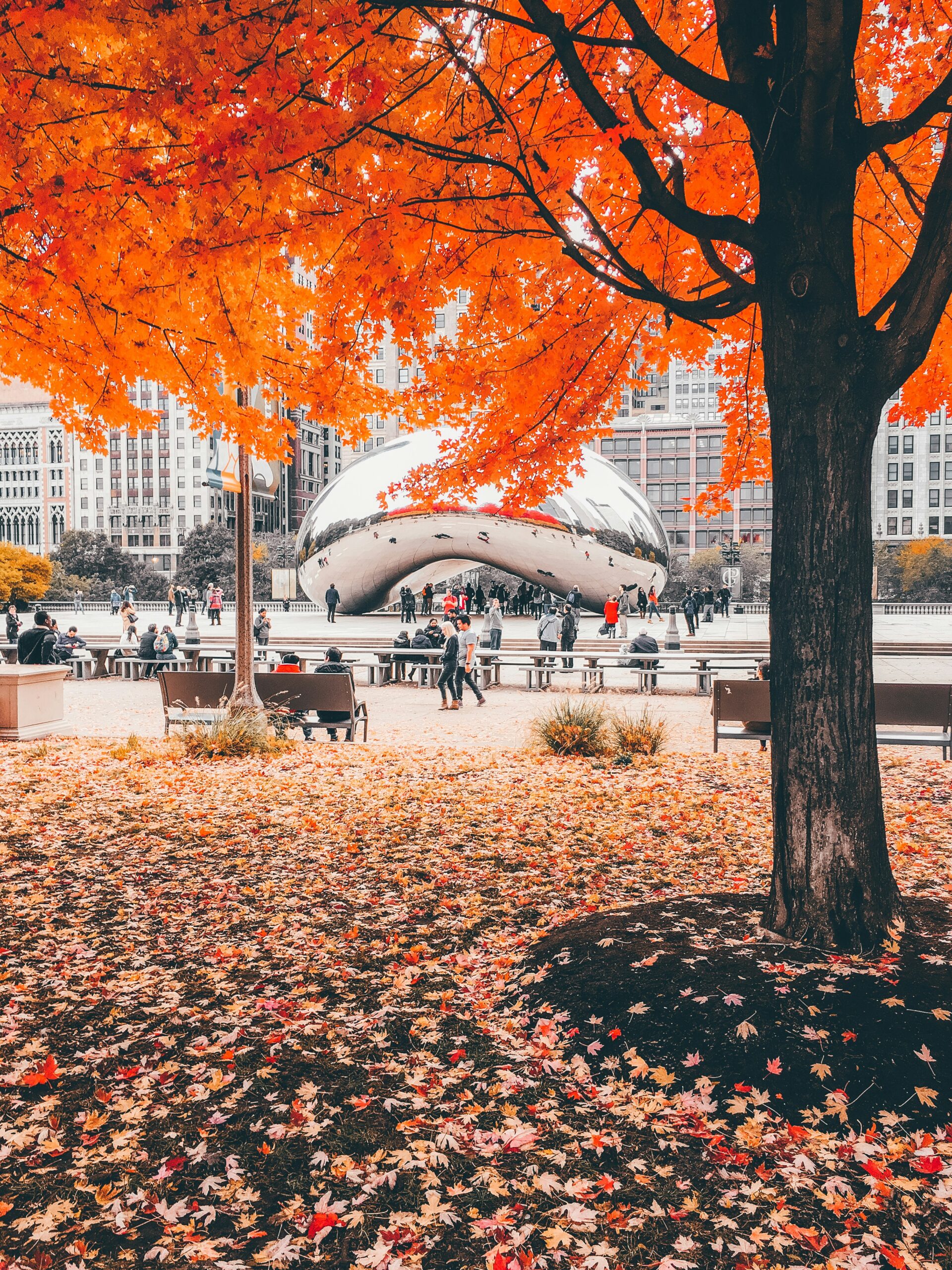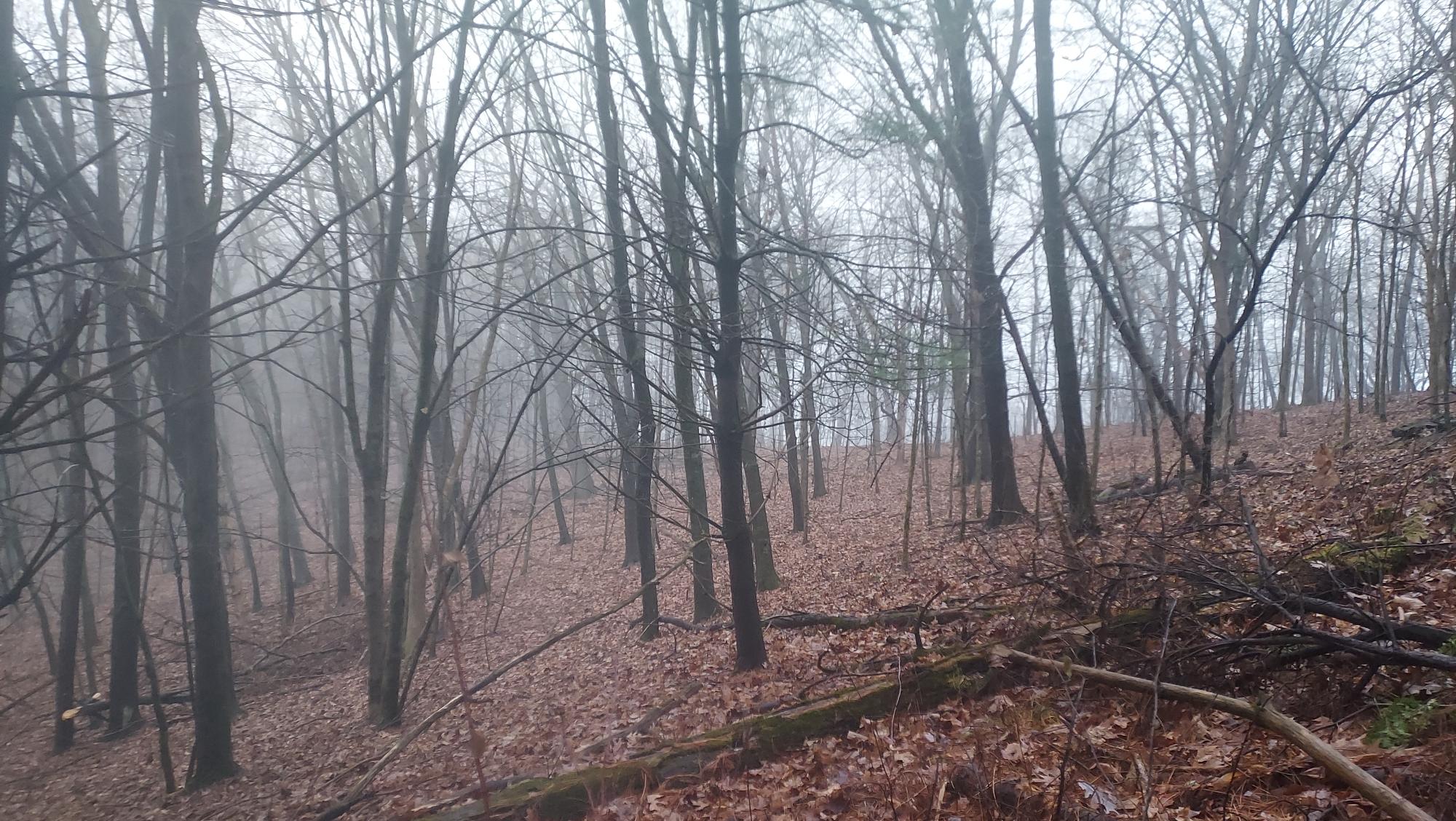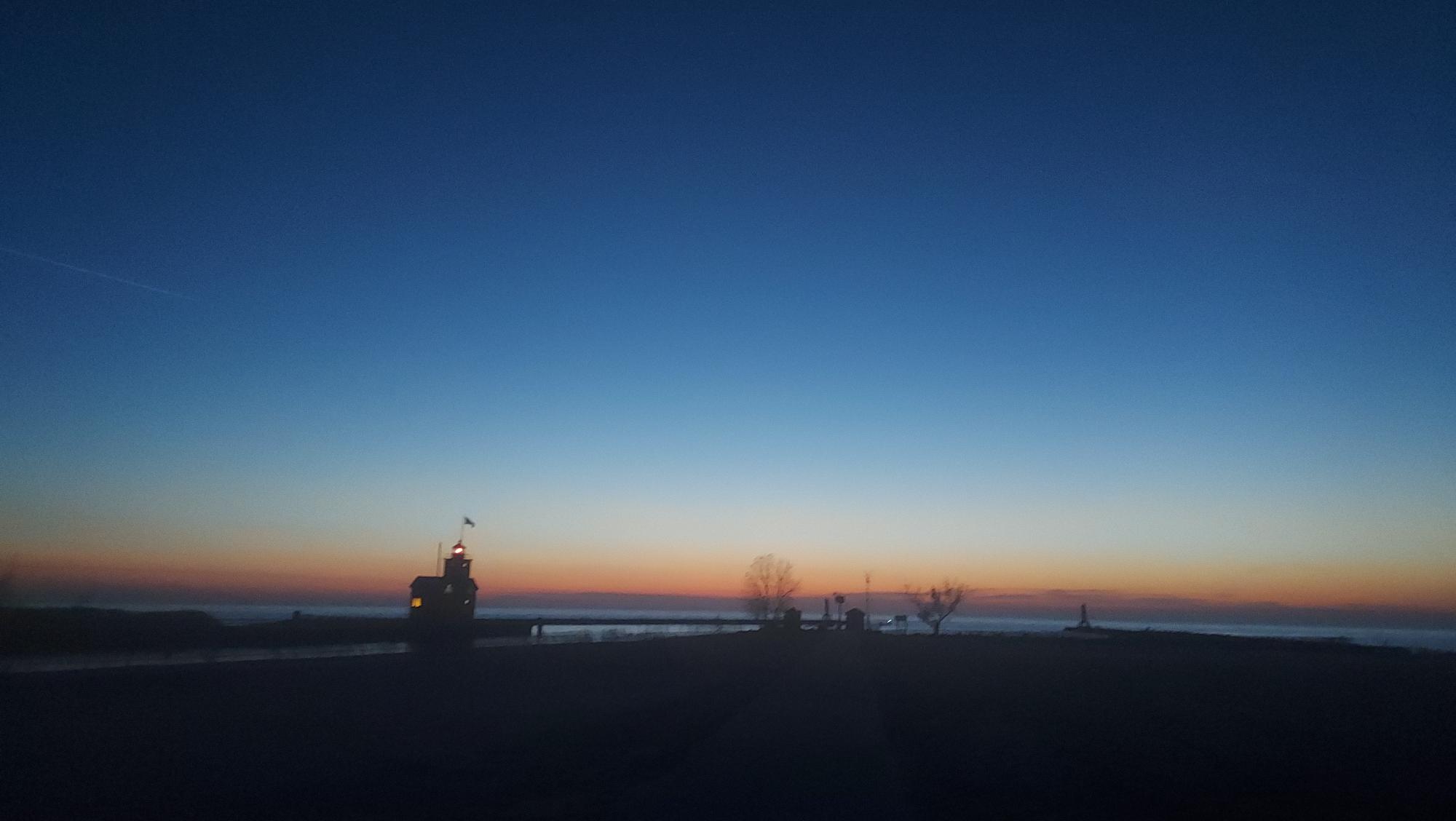I turn 60 today and I have dystopia on my mind.

The context is my weekend road-trip back to Hope College to speak in their Biology department. Part of Hope’s “Big Read” activities, the ask was to refract my research and experience through the Big Read book, Leif Enger’s I Cheerfully Refuse.
I was happy to do it. Mostly. Fall semesters are like a water slide. You jump in at entry and lose all control until it spits you out at the end. November is apogee chaos and you slide at terminal velocity, but light at the end is coming into view. I surrendered my weekends to road trips for various reasons since October and this was the latest. I agreed to this months ago, but I am tired. I made my bed and now I must lie…
Fall as a season and fall as a verb share the commonality of gravity and inevitability. I’ve watched my November fall from the caged perspective of a streaky windshield at interstate speeds. I am dipole November in the space of a day, wet and gray-sky cold and severe blue-sky clear and colder still. I watch from the interstate and scold myself. I imagine shuffling through the morning-damp leaves, serene long shadows where the dark understories were. I imagine the idle time I neglected to find.
I Cheerfully Refuse is set in a fictional future Lake Superior region beset by end-stage capitalism. Superior is pounded by storms and polluted and is home to grotesque tumor-fish. The world is ruled by wealthy elites (astronauts) living off exploitation and oppression of the masses. Local communities either come together with barter and fragile goodwill or spiral into greed and suspicion. The protagonist, Rainy, sees his wife murdered by the elites’ kommisars and escapes into Superior’s vastness in a hastily refitted little sailboat with a derelict motor for ballast, accused of some trumped up crime. Rainy plays a base guitar – sometimes in self-defense.
I riffed on the themes of dystopia, Superior as a refuge, and love and loss. I imagined the movement of that sailboat.
Dystopia, because modern wildlife conservation began in the Great Lakes region during the 1930s, a low point for large mammals in the aftermath of dust bowl erosion, timber mining, the great depression, and colonizer hubris. Refuge because the boreal character of the Lake Superior forests arguably enabled a suite of large mammals to recover. Love and loss because, well, scientific objectivity is chafing and I am a dad.
Dystopia enters my undisciplined thought while driving through Chicago. I’ve shamefully denigrated Chicago generally when I meant that I hate my signature impression of Chicago, biased by a lifetime of driving across on a network of crowded gray interstates, hoping for the least pain in transit. Last month, for reasons related to finding a charging station and to drop my daughter to a friend’s place, we navigated to Millenium Park and back through Chicago neighborhoods and I thought of friends who live in Chicago or once did. I remembered the museums and restaurants, baseball at Wrigley.

Millennium Park was the site of the finish line for the Chicago Marathon that day and Carol and I were there to cheer. In the bleachers, a beautiful young woman sat down by me with an older couple I imagined to be her parents. She tried to take a selfie of the three of them and I offered to take the photo for them. She handed me her cell phone. She waved a Mexican flag and they cheered in Spanish. I was scared for them. Chicago snow-plows were parked crosswise in the downtown side streets despite the unusual October heat. Kommissars wear face masks here.
These academic visits have a familiar pattern. You follow a schedule of meetings with individual faculty or small groups, they buy you lunch. You talk and make connections. You ask about their work and they tell you. And then you shuffle off to your next meeting. It was delightful. I enjoyed the goodwill and enthusiasm of the Hope Biology faculty and I marveled at the sophistication of the research work they do with undergrad students.
Chicago to Holland interstate crosses coastal wetlands and a mix of woodlands and farm areas. Turning north, you enter Big Lake (always capitalize) dunelands. Big hills by Midwestern standards running mostly parallel to the (Big) Lake. The back dunes (the ones you see), are wooded with red oaks and maples and their associates all the way to the top. During summer, the boundary between horizon and sky is an opaque mass of leaves, margins scalloped by canopy dominant individual trees. During November the skyline feels preternaturally old and weathered, opacity now lost to sunlight filtering though masses of dark tree trunks, now and again punctuated by red oaks too stubborn to give up their now-dead and dried leaves.

This familiar geometry is repeated everywhere in nature. Boles split into limbs, limbs into branches, branches into twigs. Species differ only in their fractal math. Dark tree trunks could be veins in my arm or veins in a leaf, conveying energy from the very sky to rootstock growing colder and more inert by the day.
The visit apogees when they show you into a conference room filling with students, staff, and faculty. They give you a glowing introduction, you key up the slides and launch. And I am the dipole professor, setting sails and switching over to auto pilot with one eye on the clock, or the imposter, draining the introvert tank with abandon and hoping for a quiet woodsy refuge when this is all over.
It went well (I think) but I let the veil drop a bit. At this stage I can afford it. My love and loss theme couldn’t help but be personal. I measured for them my 60 years against the consensus climate change projections, and then my kids’, and then that of my young friend born in 2024. Abstractions become less so and dystopia is rising.
Science is largely about sifting significance from numbers. Birthdays too. My point wasn’t to scare them or move them to despair. My point was to ask them to imagine bigger. There is nobility in studying Biology because it enables leadership and creativity needed for the stickiest questions humanity must face. I told them that. I am careful about the word “hope,” shopworn as it is these days, but I go there for these good people.
Afterward, beers and snacks with the Biology faculty (administrators note: off site and after hours) which I much enjoyed.

After that, a drive out to Holland State Park to stand next to the Big Lake answering a pull I’ve known since I was a boy. As darkness was falling, I lamented that sunset had well passed. Shrouded-sleep sailboats bunked together on the hard dreaming of summer-faire winds and Big Lake distances. Gentle waves were breaking. Fisherfolk silhouetted on the end of the pier. A few fishing boats trolled the channel. I stood there watching the glow fade from the empty watery horizon and tried to tamp down the inner voice telling me it was getting late. I stood and collected the day.
Fellow RJ blogger Christy Berghoef saw on Facebook that I had been at Hope and texted me for a meet-up. I ghosted her in an email conversation this summer so I appreciated her generosity. She directed me to a funky coffee shop not far off the first Saugatuck exit on my way back. We talked about her new book, about writing, about our shared habit of looking for inspiration outside, about returning to that well while the world around us turned dark. It was a welcome stop.
Leaving the coffee shop she remarked on how unusually warm it was.
“Yeah,” I said. “I have some anxiety about that.”
“I know you do.”
Millennium Park photo by Ozzie Stern on Unsplash


9 Responses
Happy birthday, Tim, and thanks for this gift to your readers on a day that marks my 63rd trip around the sun. I was out at the Big Lake this past weekend too. Like you at Holland State Park for a bit but also at Rosy Mounds for a spell. There we walked a new trail, part of 127 acres that recently were added to the space, bringing the park to a total of almost 300 acres of prime Lake Michigan real estate. The new acres apparently used to be a sand mining operation and now will be preserved and restored as a natural habitat. We walked away from the water through flitting and chirping purple martins on a day that, as you said, was unusually warm but also contained some hope and promise as we delighted in Rosy Mounds’ transition from an out and back to a loop. Safe travels and thanks again for your ruminations.
Such a lovely nod toward our Big Lake dunelands as you fulfilled your commitment to be with students and faculty at Hope. Having a daughter-in-law who teaches in the nursing department at Hope, as well as a granddaughter as a junior, it occured to me that you didn’t have to soft-pedal hope at Hope. Rev. Albertus VanRaalte gave the land for a school dedicated to Christian higher education because he felt higher education would help to Americanize Dutch immmigrants (very simplified version). The name came from this quote in VanRaalte’s words about in Hope’s sesquicentennial celebration: “This is my anchor of hope for this people in the future.” The symbolism follows the Epistle to the Hebrews 6:19, “We have this hope, a sure and steadfast anchor of the soul…”. For many of us, struggling with anxiety like yours, we work at leaning into this hope. Disclaimer: being a Calvin grad who could never quite get that H word out, I have grown to love and appreciate Hope College and the opportunities it has afforded our family.
I am glad to know that Hope College students and faculty have been discussing I CHEERFULLY REFUSE. Like many dystopian novels the element of hope it contains lies in a remanent of those who resist forces of isolation and destruction. Reading books, writing them, and selling them, become subversive acts in dystopian societies. Liberal arts education, if it survives the forces that are making war on it, can be a seedbed of resistance (which is why its under siege).
Finished the book earlier this week, and deeply enjoyed the session with Mr. Enger last week at Hope. Would have loved to have snuck in to hear your talk. Also deeply appreciate of the thoughtful connections you’ve made between the book and your life and work. “Abstractions become less so and dystopia is rising.” Indeed.
Your writing always draws me in even though I’ve always been hopelessly science-averse. Thus it is I learn new things. Thank you.
“We do well to reach for and remember our wild side, even as we make ourselves at home and accept that God has placed us here with a purpose and that not every manifestation of man is a blemish on creation.” — From ‘Wilderness Windows’
Your descriptions of fall’s fall ring true. And thank you for the reminder that even on these days when darkness comes early, it is necessary to find ways to head outside.
Love this piece as much as any you’ve written, although they are all really close. Thanks Tim!
I just started this book and am encouraged to read it instead of doing my grading after reading your review!